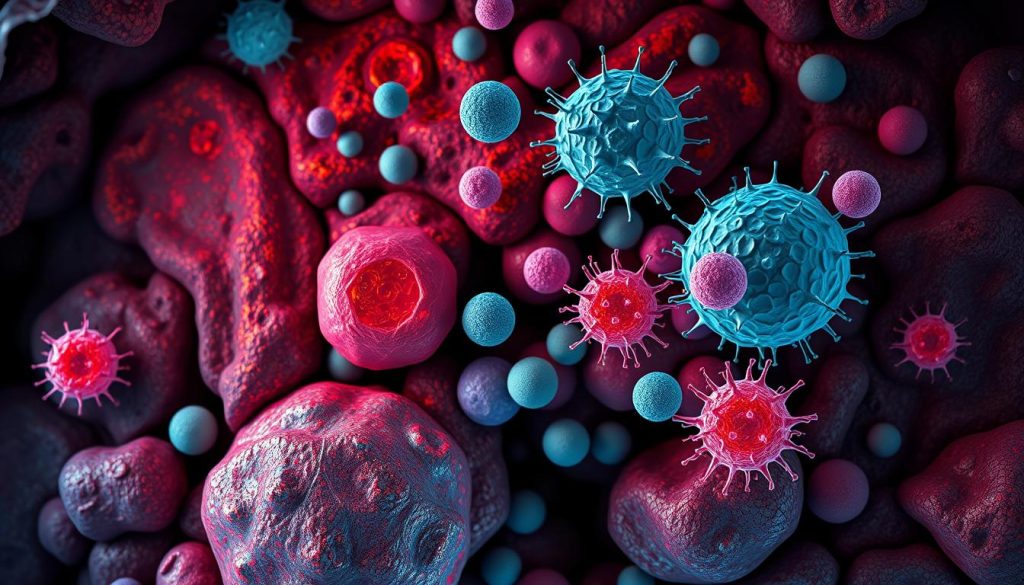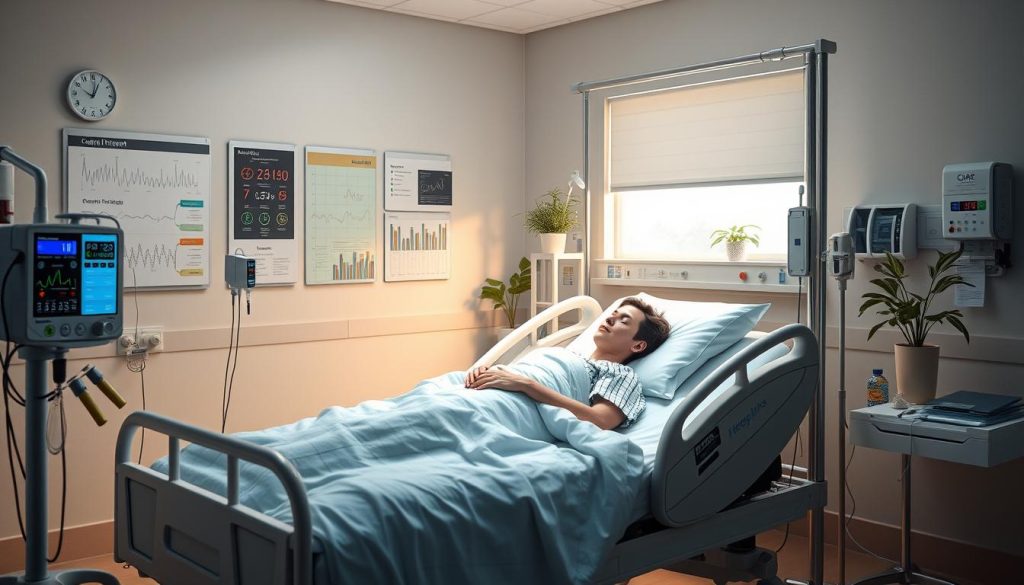When CAR T-cell therapy, a hopeful treatment for blood cancers, doesn’t work as expected, it’s tough for patients and their families. This failure can happen for many reasons. It leaves patients looking for new treatments and support to deal with relapse.
This guide aims to help understand why CAR T-cell therapy might fail. It offers insights for patients, caregivers, and doctors. Knowing why it fails and what other options are available helps patients make better choices. It also helps them get the support they need during this hard time.
We’ll look at why CAR T-cell therapy might not work, how to check if it’s working, and how to handle side effects. We’ll also talk about ways to fight resistance. Plus, we’ll cover other treatments, clinical trials, and support for patients and their families.
Understanding CAR T-Cell Therapy Failure
CAR T-cell therapy has been a game-changer for some blood cancers. But, not everyone responds well to it. It’s important for patients and their families to know about the risks and side effects.
When CAR T-cell therapy doesn’t work, it’s because the modified T-cells can’t find and kill cancer cells. This can be due to several reasons, like:
- Tumor heterogeneity and antigen escape
- Immunosuppressive tumor microenvironment
- T-cell exhaustion and dysfunction
Those getting CAR T-cell therapy might face various side effects. The most common ones include:
| Adverse Reaction | Symptoms | Management |
|---|---|---|
| Cytokine Release Syndrome (CRS) | Fever, hypotension, respiratory distress | Supportive care, tocilizumab, corticosteroids |
| Neurotoxicity | Confusion, seizures, encephalopathy | Supportive care, corticosteroids |
| B-Cell Aplasia | Hypogammaglobulinemia, increased infection risk | Intravenous immunoglobulin replacement |
Dr. Sarah Thompson, a top oncologist, says,
While CAR T-cell therapy offers hope for many patients, it is essential to understand the safety concerns and be ready to handle any complications that may come up.
It’s critical to spot CAR T-cell therapy failure signs early and act fast on any side effects. Close monitoring, supportive care, and teamwork are essential to manage the risks and side effects of this new treatment.
Factors Contributing to CAR T-Cell Therapy Failure
While CAR T-cell therapy has shown great success in treating some blood cancers, it doesn’t work for everyone. Several factors can make this treatment fail. It’s important to understand these challenges to improve treatment outcomes and fight resistance.
Tumor Heterogeneity and Antigen Escape
One big problem with CAR T-cell therapy is tumor heterogeneity. Cancer cells in one tumor can be very different, making them hard to target. This means some cancer cells can avoid being killed by CAR T-cells, a problem called antigen escape. Even if the treatment seems to work at first, cancer can come back because of these hidden cells.

Immunosuppressive Tumor Microenvironment
The area around a tumor, including blood vessels and immune cells, can also block CAR T-cell therapy. Some tumors create a hostile environment that stops CAR T-cells from working. This environment has cells that suppress the immune system and produces factors that slow down CAR T-cells.
T-Cell Exhaustion and Dysfunction
Another issue is T-cell exhaustion and dysfunction. CAR T-cells can get tired and lose their ability to kill cancer cells after fighting for a long time. They also become less effective because of the tumor’s immune-suppressing environment. This makes it harder for CAR T-cells to fight cancer.
| Factor | Impact on CAR T-Cell Therapy |
|---|---|
| Tumor Heterogeneity | Allows antigen escape and cancer relapse |
| Immunosuppressive Microenvironment | Inhibits CAR T-cell function and survival |
| T-Cell Exhaustion | Reduces CAR T-cell ability to kill tumor cells |
| T-Cell Dysfunction | Compromises anti-tumor activity of CAR T-cells |
It’s key to tackle these issues to make CAR T-cell therapy more effective. Scientists are working on ways to deal with tumor heterogeneity, the immune-suppressing environment, and T-cell exhaustion. By addressing these challenges, we can make CAR T-cell therapy work better for more patients.
Monitoring CAR T-Cell Therapy Response
It’s very important to watch how a patient reacts to CAR T-cell therapy. This helps doctors see if the treatment is working and if there are any risks. They use advanced imaging and check certain biomarkers to understand how the therapy is doing.
Imaging Techniques for Assessing Treatment Efficacy
Imaging is key in checking if CAR T-cell therapy is working. Doctors use PET and CT scans to see how tumors are shrinking and if they’re coming back. These methods give doctors important information right away, helping them act fast if needed.
Newer imaging tools like functional magnetic resonance imaging (fMRI) and single-photon emission computed tomography (SPECT) give even more details. They help doctors see how CAR T-cells are working in the tumor. This helps them understand how well the therapy is working.
“Imaging is a powerful tool in the arsenal of CAR T-cell therapy monitoring. It allows us to see the bigger picture and make informed decisions to optimize patient outcomes.”
Biomarkers for Predicting CAR T-Cell Therapy Outcomes
Biomarkers are also very important in predicting how well CAR T-cell therapy will work. By looking at certain molecules or cells in blood or tumors, doctors can guess how well the treatment will do. Some important biomarkers include:
- CAR T-cell persistence and expansion
- Cytokine levels (e.g., IL-6, IFN-γ)
- Tumor antigen expression
- Immune checkpoint markers (e.g., PD-1, CTLA-4)
By checking these biomarkers often during treatment, doctors can spot problems early. This lets them change the treatment plan or try something else to help the patient.
Management of CAR T-Cell Therapy Side Effects
While CAR T-cell therapy is a big win for some blood cancers, it comes with side effects. It’s key to manage these to keep patients safe and get the best results. Let’s look at common side effects and how to handle them.

Cytokine Release Syndrome (CRS)
CRS is a big issue with CAR T-cell therapy. It shows as fever, low blood pressure, and trouble breathing. It’s important to spot and grade CRS quickly to act fast.
Mild CRS might need just support care. But severe cases need serious care and tocilizumab to fight the inflammation.
Neurotoxicity
Neurotoxicity, or ICANS, can cause confusion, delirium, or seizures. Watching for these signs is critical. Treatment might include steroids, seizure meds, or just support.
In bad cases, a ventilator might be needed to keep the airway safe and oxygen flowing.
B-Cell Aplasia and Hypogammaglobulinemia
Targeting B-cells with CAR T-cells can lead to B-cell aplasia and low immunoglobulins. This makes infections more likely, like those from encapsulated bacteria. Keeping an eye on immunoglobulin levels and using IVIG can help prevent infections.
Handling CAR T-cell therapy side effects well needs a team effort. Doctors, critical care experts, and support teams must work together. It’s also important to teach patients and their families about possible side effects and the need to report them quickly.
Strategies for Overcoming CAR T-Cell Therapy Resistance
Even though CAR T-cell therapy has shown great success in treating some blood cancers, it doesn’t work for everyone. This is because some patients develop resistance to the treatment. Researchers are working hard to find new ways to make CAR T-cell therapy more effective and lasting.
Targeting Multiple Tumor Antigens
One way to beat CAR T-cell therapy resistance is to target more than one tumor antigen. By making CAR T-cells that can attack several antigens at once, the chance of cancer cells avoiding the treatment goes down. This multi-targeted approach helps prevent cancer cells from evading the therapy by changing their antigen levels.
Scientists are creating CAR T-cells that can target different antigens. For example:
- CD19 and CD22 for B-cell malignancies
- BCMA and CD38 for multiple myeloma
- HER2 and IL13Rα2 for solid tumors
By targeting multiple antigens, the chances of getting a complete and lasting response in patients with resistance can greatly improve.
Enhancing CAR T-Cell Persistence and Functionality
Another strategy to fight CAR T-cell therapy resistance is to make the T-cells last longer and work better. It’s important for CAR T-cells to stay active for a long time to keep the treatment effective and prevent cancer from coming back. Researchers are looking into ways to improve CAR T-cell persistence, such as:
| Method | Description |
|---|---|
| Modifying CAR designs | Incorporating costimulatory domains (e.g., CD28, 4-1BB) to enhance T-cell activation and survival |
| Optimizing manufacturing processes | Selecting T-cell subsets with greater proliferative capacity and longer persistence |
| Genetic engineering | Introducing genes that promote T-cell survival and resist exhaustion (e.g., IL-15, IL-7) |
Improving CAR T-cell functionality is also key to overcoming resistance. Ways to enhance CAR T-cell functionality include:
- Armoring CAR T-cells with cytokines or checkpoint inhibitors to counteract immunosuppressive tumor microenvironments
- Developing CAR T-cells with inducible or switchable receptors to allow for better control over their activity
- Combining CAR T-cell therapy with other immunotherapies or targeted therapies to synergistically enhance anti-tumor responses
By focusing on improving CAR T-cell persistence and functionality, researchers hope to create more effective and lasting CAR T-cell therapies. These therapies aim to overcome resistance and provide long-term benefits to patients.
Alternative Treatments After CAR T-Cell Therapy Failure
When CAR T-cell therapy doesn’t work, patients and doctors look for other options. These alternatives aim to help and possibly improve results. Let’s explore some common choices.

Salvage Chemotherapy
Salvage chemotherapy uses new drugs or combinations not tried before. It aims to fight cancer cells that have grown resistant. Doctors tailor the treatment to each patient, considering their cancer type, past treatments, and health.
Allogeneic Stem Cell Transplantation
Allogeneic stem cell transplantation uses healthy donor stem cells to replace the patient’s damaged bone marrow. It can help rebuild the immune system and fight cancer. But, it comes with risks like graft-versus-host disease and infections.
Targeted Therapies and Immunotherapies
For those who didn’t respond to CAR T-cell therapy, targeted therapies and immunotherapies are options. They focus on specific cancer targets or boost the immune system. Examples include:
- Small molecule inhibitors that block cancer cell signals
- Monoclonal antibodies that target cancer cell surfaces
- Checkpoint inhibitors that help the immune system fight cancer
- Bispecific antibodies that help destroy tumor cells
The right choice depends on the cancer’s specific traits. Precision medicine uses detailed tumor analysis to guide treatment.
| Treatment | Mechanism of Action | Potential Benefits | Risks and Challenges |
|---|---|---|---|
| Salvage Chemotherapy | Targets cancer cells with different chemotherapy drugs | May overcome resistance to prior therapies | Side effects, toxicity, limited efficacy |
| Allogeneic Stem Cell Transplantation | Replaces damaged bone marrow with healthy donor stem cells | Can restore immune system and eliminate cancer cells | Graft-versus-host disease, infections, complications |
| Targeted Therapies and Immunotherapies | Focus on specific molecular targets or immune system modulation | Personalized approach based on tumor characteristics | Limited to specific cancer types, possible resistance |
Clinical Trials for Patients with CAR T-Cell Therapy Failure
When CAR T-cell therapy fails, patients may feel lost and unsure. But, clinical trials can offer hope. These trials give access to new treatments that might improve life quality.
Clinical trials for CAR T-cell therapy failure explore new ideas. They look at:
- Next-generation CAR designs with better specificity and power
- Combination therapies using different treatment methods
- New targets and antigen discovery to fight tumor changes and escape mechanisms
Joining clinical trials means getting new treatments and helping science grow. Patients help shape cancer care’s future and support others facing similar issues.
“Clinical trials are the lifeline for patients with CAR T-cell therapy failure. They offer hope, support, and the chance to be part of something bigger than ourselves.” – Sarah, a CAR T-cell therapy patient
Talking to a healthcare team is key when thinking about clinical trials. They can find the right trials based on your cancer type, past treatments, and health. Here are some important things to think about:
| Factor | Consideration |
|---|---|
| Eligibility criteria | Make sure the trial fits your specific condition and characteristics |
| Trial location | Check if you can travel and stay for the trial, if needed |
| Potential risks and benefits | Think about the good and bad sides of the trial |
| Support services | Ask about help for emotional, financial, and practical needs |
Choosing to join a clinical trial is a big decision. It needs careful thought and talking with healthcare providers and family. For those facing CAR T-cell therapy failure, trials might be a ray of hope. They offer a chance to try new treatments that could better their life.
Supportive Care and Quality of Life Considerations
When CAR T-cell therapy fails, it’s key to focus on supportive care and quality of life. Palliative care helps manage symptoms and improves well-being. A team of doctors, nurses, and social workers works together to meet each patient’s needs.
Managing symptoms is a big part of supportive care. Patients might feel pain, tiredness, or nausea. Specialists create plans to help, which can include medicine, therapy, and things like acupuncture.
Patients also face emotional challenges when CAR T-cell therapy fails. It’s important to offer psychosocial support. Counseling and support groups help them deal with their feelings and find meaning.
Keeping quality of life high is the main goal. This means taking care of physical, emotional, and spiritual needs. Palliative care teams help by managing symptoms, supporting emotionally, and helping with practical issues.
- Managing pain and other symptoms effectively
- Providing emotional and psychosocial support
- Facilitating communication and decision-making
- Offering respite care for caregivers
- Addressing practical concerns, such as financial and legal matters
The table below shows important supportive care actions and their benefits for patients facing CAR T-cell therapy failure:
| Supportive Care Intervention | Benefits |
|---|---|
| Symptom management | Reduces pain and discomfort, improves functional capacity |
| Psychosocial support | Enhances coping skills, reduces distress, promotes emotional well-being |
| Advance care planning | Ensures patients’ wishes are respected, reduces decisional burden on families |
| Spiritual care | Provides meaning and purpose, offers comfort and peace |
“Supportive care is not just about managing symptoms; it’s about embracing the whole person and supporting them in living their best life, even in the face of difficult circumstances.”
– Dr. Jane Smith, Palliative Care Specialist
By focusing on supportive care and quality of life, healthcare providers can help patients deal with CAR T-cell therapy failure. A caring, patient-focused approach is key to ensuring patients get the care they need during tough times.
What Happens If CAR T-Cell Therapy Fails
When CAR T-cell therapy fails, patients and their families face a tough journey. The failure can affect both their physical and emotional health. This can be a big challenge.
Short-Term and Long-Term Implications
Patients might feel disappointed and frustrated at first. They may need to look into other treatments. These can be hard and risky.
The long-term effects depend on each patient. Some might find new treatments work, while others face tougher times. The uncertainty can be hard on everyone.
Emotional and Psychological Impact on Patients and Families
The emotional toll of failure is huge. Patients might feel sad, angry, and scared. They worry about more treatments and their effects.
Families and caregivers also feel the weight. They might feel helpless and unsure how to help. It’s key to have mental health support for all.
| Short-Term Impact | Long-Term Impact |
|---|---|
| Disappointment and frustration | Uncertainty about future treatment options |
| Need for alternative treatments | Emotional challenges for patients and families |
| Physical demands of new therapies | Potential for remission or more challenging prognosis |
As Dr. Sarah Johnson, a leading oncologist, explains:
When CAR T-cell therapy fails, it can be a devastating blow for patients and their families. It’s vital that we offer them the best medical care and emotional support during this tough time.
Prognosis and Survival After CAR T-Cell Therapy Failure
When CAR T-cell therapy fails, patients and their families often face uncertainty about the future. The prognosis and survival rates depend on many factors. These include the type of cancer, how far the disease has spread, and the patient’s overall health.
Studies show that those who don’t respond well to CAR T-cell therapy might have shorter survival times. But, it’s important to remember that each case is different. Long-term outcomes can vary a lot.

Several factors can affect prognosis and survival after CAR T-cell therapy failure. These include:
- The type and stage of cancer
- The presence of other health conditions
- The availability of alternative treatment options
- The patient’s age and overall fitness
The table below gives a general idea of survival rates for different cancers after CAR T-cell therapy failure:
| Cancer Type | Median Survival After CAR T-Cell Therapy Failure |
|---|---|
| Acute Lymphoblastic Leukemia (ALL) | 6-12 months |
| Diffuse Large B-Cell Lymphoma (DLBCL) | 3-6 months |
| Multiple Myeloma | 12-18 months |
Patients who have failed CAR T-cell therapy should stay close to their healthcare team. They should watch for signs of disease progression and look into other treatment options. Regular check-ups and open communication can help achieve the best long-term outcomes and quality of life.
While the prognosis after CAR T-cell therapy failure can be tough, every patient’s journey is unique. There is always hope for better days ahead.
Emerging Approaches to Improve CAR T-Cell Therapy Outcomes
Researchers are finding new ways to make CAR T-cell therapy better. They want to make it more effective and reduce the chance of it not working. These emerging approaches include improving CAR designs and trying out new combinations of treatments.
Next-Generation CAR Designs
Next-generation CAR designs aim to fix what’s not working in current CAR T-cell therapies. They add new features to make the treatment stronger and more focused. Some of these new features include:
- Dual-targeting CARs that can find and attack more than one tumor antigen at a time
- Armored CARs with extra parts to help T-cells work better
- Switchable CARs that can be controlled with small molecules, giving doctors more flexibility
These next-generation CAR designs could make CAR T-cells more effective. This could lead to better results for patients.
Combination Therapies
Combination therapies mix CAR T-cell therapy with other treatments to get better results. Some promising combinations include:
| Combination Therapy | Mechanism of Action |
|---|---|
| CAR T-cells + Checkpoint Inhibitors | Helps T-cells work better by blocking signals that slow them down |
| CAR T-cells + Targeted Therapies | Targets different ways cancer grows at the same time |
| CAR T-cells + Radiation Therapy | Makes tumors more visible to T-cells and helps them get inside |
The future of CAR T-cell therapy is about finding new ways to use the immune system. We want to make it work better and avoid treatment failure.
By looking into combination therapies and emerging approaches, scientists are working on better CAR T-cell treatments. These treatments could help patients who have tried everything else.
Importance of Multidisciplinary Care Teams
In the face of CAR T-cell therapy failure, the importance of multidisciplinary care teams is huge. These teams include experts from fields like oncology, immunology, and supportive care. They work together to give patients the best care possible.

These teams make sure patients get care that fits their needs. Oncologists plan the treatment, while immunologists focus on the immune response. Supportive care specialists help with the physical and emotional side of treatment failure.
“The collaboration between oncologists, immunologists, and supportive care specialists is essential for providing the highest quality of care for patients facing CAR T-cell therapy failure.”
Regular meetings and open communication are key for teamwork. By sharing insights and coordinating plans, the team can make the best decisions. This teamwork helps improve patient outcomes and quality of life, even when treatment is tough.
Collaboration Between Oncologists, Immunologists, and Supportive Care Specialists
Each specialist in the team has a unique role:
| Specialist | Key Responsibilities |
|---|---|
| Oncologist | Develops and oversees the overall treatment plan, monitors response, and adjusts therapy as needed. |
| Immunologist | Studies the patient’s immune response, identifies factors contributing to therapy failure, and explores strategies to enhance CAR T-cell functionality. |
| Supportive Care Specialists | Address side effects, manage pain, provide emotional support, and help maintain quality of life throughout the treatment journey. |
By working together seamlessly, these specialists ensure no part of care is missed. The team’s approach is vital for managing CAR T-cell therapy failure. It offers hope and support during tough times. For more on CAR T-cell therapy duration and the role of teams, check our treatment guide.
Patient Education and Advocacy
When facing CAR T-cell therapy failure, patient education is key. It helps people make smart choices about their treatment and care. Doctors should talk clearly and simply to help patients grasp the complex issues at hand.
Patient advocacy groups provide important support and guidance. They offer emotional help and connect patients with others who’ve gone through similar struggles. These groups also push for more research and better access to new treatments.
When patients are informed and empowered, they can take a more active role in their care. They can ask questions and share their wishes with their healthcare team. This way, patients can focus on their physical, emotional, and mental health during tough times. In the end, education and advocacy are vital for those dealing with CAR T-cell therapy failure.
FAQ
Q: What are the signs that CAR T-cell therapy may be failing?
A: Signs of CAR T-cell therapy failure include persistent or worsening symptoms. Also, a lack of response to treatment and cancer relapse are indicators. Imaging techniques and biomarkers help spot treatment failure early.
Q: What factors contribute to CAR T-cell therapy failure?
A: Several factors can lead to CAR T-cell therapy failure. These include tumor heterogeneity and antigen escape. An immunosuppressive tumor microenvironment and T-cell exhaustion or dysfunction also play a role. These factors can cause treatment resistance and suboptimal outcomes.
Q: What are the common side effects of CAR T-cell therapy?
A: Common side effects include cytokine release syndrome (CRS) and neurotoxicity. B-cell aplasia and hypogammaglobulinemia are also common. These adverse reactions need close monitoring and prompt management to ensure patient safety.
Q: What alternative treatments are available after CAR T-cell therapy failure?
A: After CAR T-cell therapy failure, alternative treatments include salvage chemotherapy and allogeneic stem cell transplantation. Targeted therapies and immunotherapies are also options. The choice depends on the patient’s situation and their healthcare team’s guidance.
Q: Are there any clinical trials available for patients with CAR T-cell therapy failure?
A: Yes, clinical trials are available for patients with CAR T-cell therapy failure. These trials offer experimental treatments and new approaches. Patients should discuss clinical trials with their healthcare team.
Q: What is the prognosis for patients after CAR T-cell therapy failure?
A: The prognosis after CAR T-cell therapy failure varies. It depends on the cancer type and stage, overall health, and response to alternative treatments. Close monitoring and follow-up care are key to address complications or disease progression.
Q: What supportive care measures are available for patients facing CAR T-cell therapy failure?
A: Supportive care includes palliative care, symptom management, and psychosocial support. These measures aim to improve well-being, address physical and emotional needs, and help cope with treatment failure challenges.
Q: What emerging approaches are being developed to improve CAR T-cell therapy outcomes?
A: Researchers are exploring new approaches to enhance CAR T-cell therapy outcomes. These include developing next-generation CAR designs and combination therapies. These innovations aim to improve therapy efficacy, safety, and durability, reducing treatment failure risk.


















